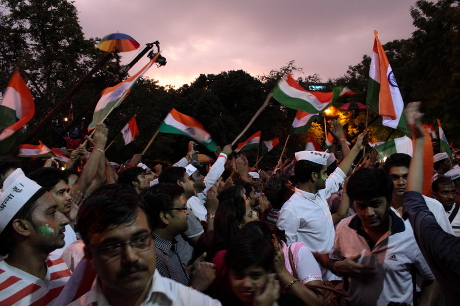
When it comes to human rights, India is a paradoxical case. On the one hand she is praised as a regional standard-bearer, too-often celebrated as ‘the world’s largest democracy’ and applauded for protecting rights when her neighbours do not. On the other hand, the rights community is unanimous in its condemnation of India’s human rights record. Brutal oppression in Kashmir, state mandated ‘encounters’ (unlawful killings) and the violations of tribal land rights are but three of the recurring complaints made of India’s human rights protection record.
The picture is more complicated when it comes to international relations. For many, including Salil Shetty, the Secretary General of Amnesty International, India’s rising power status brings with it a greater responsibility to promote rights internationally. Meenakshi Ganguly, South Asia Director of Human Right Watch, said something similar in in a recent high-profile piece: urging India to do more to secure rights globally.
Of course India should do as much as it can to encourage rights protection beyond its borders. But such conclusions fail to explain why India is a reluctant partner in the international effort to protect rights. Perhaps the most instructive question is ‘is it in India’s interests to promote rights globally?’. Regrettably the answer is ‘no’.
The reasons behind this are the politics of the developing world and India’s great power strategies.
Developing world diplomacy
In light of the terrible rights record of the Raj it may seem puzzling that India has shied away from encouraging rights protection elsewhere. But this very history of imperialism has elevated state sovereignty to the status of a governing principle in the international relations of the developing world. This valorisation of sovereignty manifests in a reluctance to interfere in the domestic affairs of other nations. This commitment to both sovereignty and non-interference extends to international human rights and India, as Foreign Minister Shyam Saran insists, is not in the business of ‘exporting ideologies’.
And in terms of ‘ideologies’, the rights community must concede that conceptions of human rights differ across regions. The writings of Rajni Kothari – one of India’s leading thinkers and a former president of the country’s largest human rights organization – is replete with dismissals of civil and political rights as foreign ideals. He argues that they are ill-suited to India’s communitarian polity in which collective rights – emphasizing social, economic and cultural empowerment – are more important. Meenakshi Ganguly’s piece explains India’s foreign policy elites are reluctant to follow Western-led initiatives. Prevailing understandings of human rights and international rights advocacy both fall into this category.
India’s great power politics: doing things differently
Perversely, India enjoys a reputation as a regional model: a functioning democracy with enviable rights standards despite its reluctant rights promotion.
This contradiction can be reconciled by appreciating India’s efforts to be seen as a reformed global role model, an effort characterised by a non-imperialist foreign policy. The reformed approach is best evidenced by India’s reactive, not pro-active, democracy promotion strategy. In 2005, through a 10 million (USD) contribution, India supported the establishment of the UN Democracy Fund (UNDEF). But when speaking on UNDEF in 2006, Shyam Saran, India’s Foreign Secretary, said ‘we do not believe in the imposition of democracy. But if there is an interest in any country in our democratic experience…we are ready to share this’.
A reformed role model approach, when applied to human rights diplomacy, takes the form of a laissez-faire attitude to rights promotion. Doing so is strategically prudent on several levels. First, it avoids embarrassing questions about India’s domestic rights record. Second it avoids the charge of hypocrisy that muscular rights promoters face by enforcing rights abroad and abrogating them at home. Third, the international relations of human rights are highly charged, and India’s light touch on the subject avoids offending or alienating potential strategic partners. Fourth, reluctant rights promotion maximises India’s freedom of activity: by holding other nations to relaxed rights standards, India grants itself equal licence to be unconstrained by rights concerns. These strategic freedoms, many of which are central to India’s great power project, combine to discourage India from using its growing international influence to encourage rights protection.
Building on modest gains
Certainly India’s potential to secure rights globally remains unfulfilled. But human rights – highly contentious norms, often maligned as ‘western’ ideologies – are difficult to reconcile with India’s effort to be a reformed global role model. As a player of the politics of the developing world and as an aspirant great power, notions of state sovereignty, non-imperialism and strategic freedom underpin India’s diplomatic priorities. Each deliver foreign policy advantages that trump any benefits that might accrue from rights promotion.
As Meenakshi Ganguly laments, India’s refusal to promote rights is detrimental to the world’s marginalised and oppressed. But as Stephen Hopgood, a rights expert at SOAS, insists, it is activists and not states will make the difference. Faith should therefore be placed instead in India’s social movements. The nationwide gender justice movement that emerged following the horrific Delhi gang rape and persistent popular protests against official corruption are testament to India’s capacity to mount pro-rights collective action. It is through setting this example that India can best lead in the effort to secure rights globally.
Versions of this article appeared in the openGlobalRights section of openDemocracy and on the Oxford India Policy Series.




1 Comment